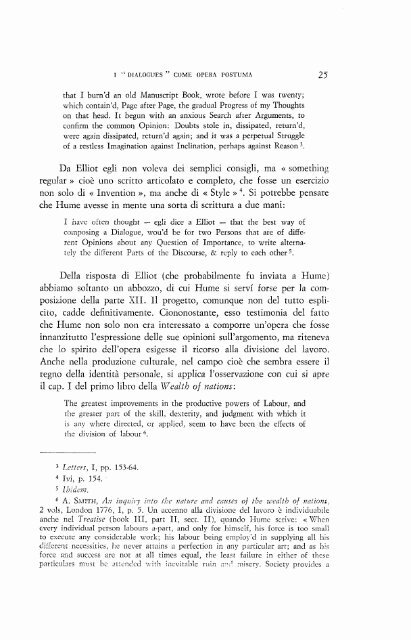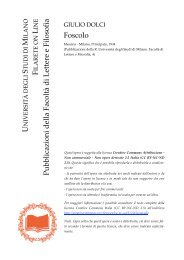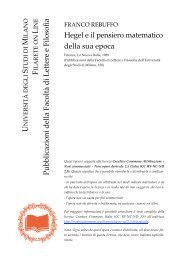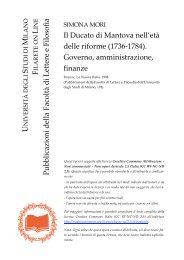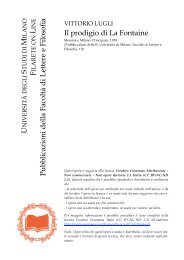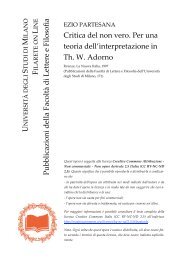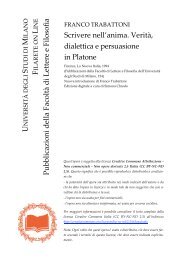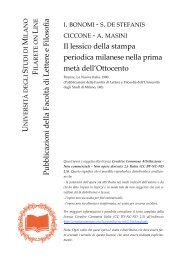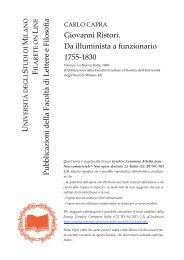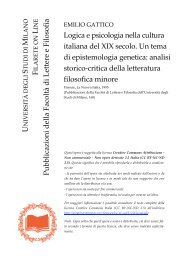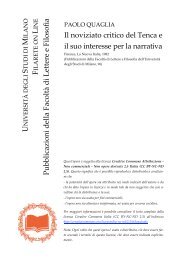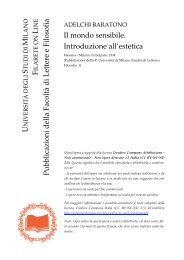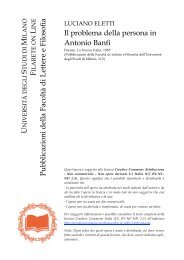Dialoghi sulla religione naturale - Studi umanistici Unimi - Università ...
Dialoghi sulla religione naturale - Studi umanistici Unimi - Università ...
Dialoghi sulla religione naturale - Studi umanistici Unimi - Università ...
Create successful ePaper yourself
Turn your PDF publications into a flip-book with our unique Google optimized e-Paper software.
I " DIALOGUES " COME OPERA POSTUMA 25<br />
that I burn'd an old Manuscript Book, wrote before I was twenty;<br />
which contain'd, Page after Page, thè graduai Progress of my Thoughts<br />
on that head. It begun with an anxious Search after Arguments, to<br />
confrrm thè common Opinion: Doubts stole in, dissipated, return'd,<br />
were again dissipated, return'd again; and it was a perpetuai Struggle<br />
of a restless Imagination against Inclination, perhaps against Reason 3 .<br />
Da Elliot egli non voleva dei semplici consigli, ma « something<br />
regular » cioè uno scritto articolato e completo, che fosse un esercizio<br />
non solo di « Invention », ma anche di « Style » 4 . Si potrebbe pensare<br />
che Hume avesse in mente una sorta di scrittura a due mani:<br />
I have often thought — egli dice a Elliot — that thè best way of<br />
composing a Dialogue, wou'd be for two Persons that are of diffe-<br />
rent Opinions about any Question of Importance, to write alterna-<br />
tely thè difFerent Parts of thè Discourse, & reply to each other 5 .<br />
Della risposta di Elliot (che probabilmente fu inviata a Hume)<br />
abbiamo soltanto un abbozzo, di cui Hume si servi forse per la com<br />
posizione della parte XII. Il progetto, comunque non del tutto espli<br />
cito, cadde definitivamente. Ciononostante, esso testimonia del fatto<br />
che Hume non solo non era interessato a comporre un'opera che fosse<br />
innanzitutto l'espressione delle sue opinioni sull'argomento, ma riteneva<br />
che lo spirito dell'opera esigesse il ricorso alla divisione del lavoro.<br />
Anche nella produzione culturale, nel campo cioè che sembra essere il<br />
regno della identità personale, si applica l'osservazione con cui si apre<br />
il cap. I del primo libro della Wealth of nations:<br />
The greatest improvements in thè productive powers of Labour, and<br />
thè greater part of thè skill, dexterity, and judgment with which it<br />
is any where directed, or applied, seem to have been thè effects of<br />
die division of labour 6 .<br />
3 Letters, I, pp. 153-64.<br />
4 Ivi, p. 154.<br />
5 ìbidem.<br />
6 A. SMITH, An inqtnry into thè nature and causes of thè wcalth of nations,<br />
2 vols, London 1776, I, p. 5. Un accenno alla divisione del lavoro è individuabile<br />
anche nel Treatise (hook III, part II, sect. II), quando Hume scrive: « When<br />
every individuai person labours a-part, and only for himself, his force is too small<br />
to execute any considerable work; his labour being employ'd in supplying ali his<br />
difiereut necessities, he never attains a perfection in any particular art; and as his<br />
force and success are not at ali times equal, thè least fallure in either of thcse<br />
particulars must be attendcd with inevitable min and misery. Society provides a


